
The Dark Phoenix Saga has been framed as a cautionary tale centered on how, as Lord Acton once wrote, "absolute power corrupts absolutely." However, it is a tragedy that illustrates the cumulative effects of grief, abuse, trauma, dissociation, and addiction. 1/36 #XSpoilers 

Technically, the "saga" begins after the X-Men battle Magneto, and Jean and Beast believe the rest of their teammates to be dead. Unbeknownst to them, however, the others have been transported to the Savage Land and believe Jean and Beast to be dead. 2/36 





Jean is grief-stricken by the seeming death of her teammates—her chosen family— which leaves her feeling alone and displaced. Her guilt over not being able to save them causes a surge in her power and she unintentionally reads Xavier's mind. 3/36 







This, coupled with the death of her teammates, causes her great pain and soon after she decides to leave to the school to gather her thoughts and feelings. Her grief is compounded by failing to connect with her friend and former roommate Misty Knight before traveling abroad. 4/36 



As an aside: Chris Claremont figures Misty prominently in Jean's personal life, both in-story and in later backstories. She is the first person to whom Jean reveals her feelings of dissociation, fear of her growing power, and that she died before being reborn as Phoenix. 5/36 







Additionally, throughout various scenes and backstories, Claremont hints at the increasingly intoxicating quality of Jean's newfound abilities. At one point, she notes to herself, "My power—it's hitting me like a drug...I've never felt such ecstasy." 6/36 







After Jean vacations abroad for a period, she visits Muir Island to stay with Moira McTaggert, to whom Xavier introduced Jean during her prepubescence, before the X-Men were formed. Jean tells Moira she should have died and buckles under the weight of her guilt and grief. 7/36 







Later, Moira assesses Jean's abilities, and both women express their worry about her capacity to handle her growing power. This prompts Jean to quietly reflect on her life and travels since dying and being reborn as Phoenix. 8/36 







We learn Wyngarde, in the guise of various people, began stalking and quietly grooming her at the height of her grief and is keeping tabs on and increasingly manipulating her. Wyngarde's role as perpetrator in this story is pivotal though, unfortunately, often overlooked. 9/36 





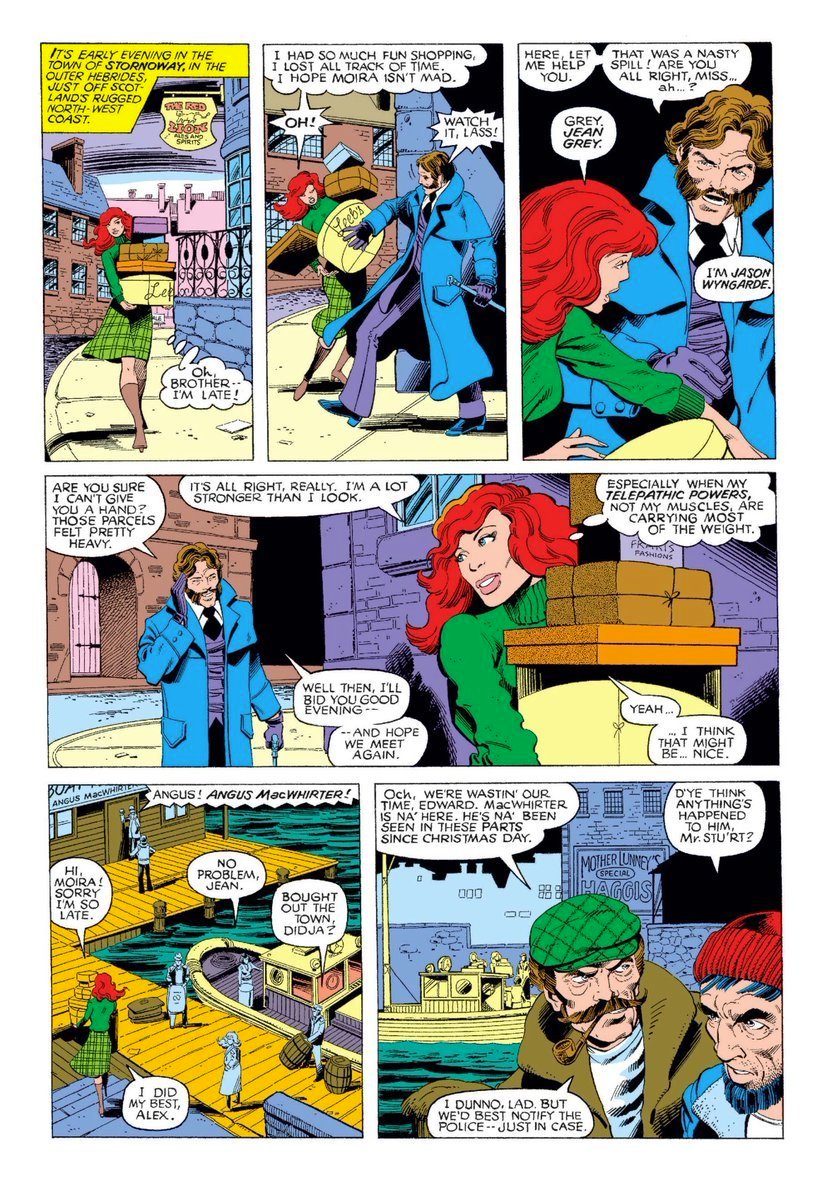

An unsettling backstory that takes place prior to Jean visiting Moira underscores the grooming and abuse to which Wyngarde increasingly subjects her. Claremont wrote this story to spotlight Wyngarde's perpetrations and add context to Jean's later post-traumatic breakdown. 10/36 





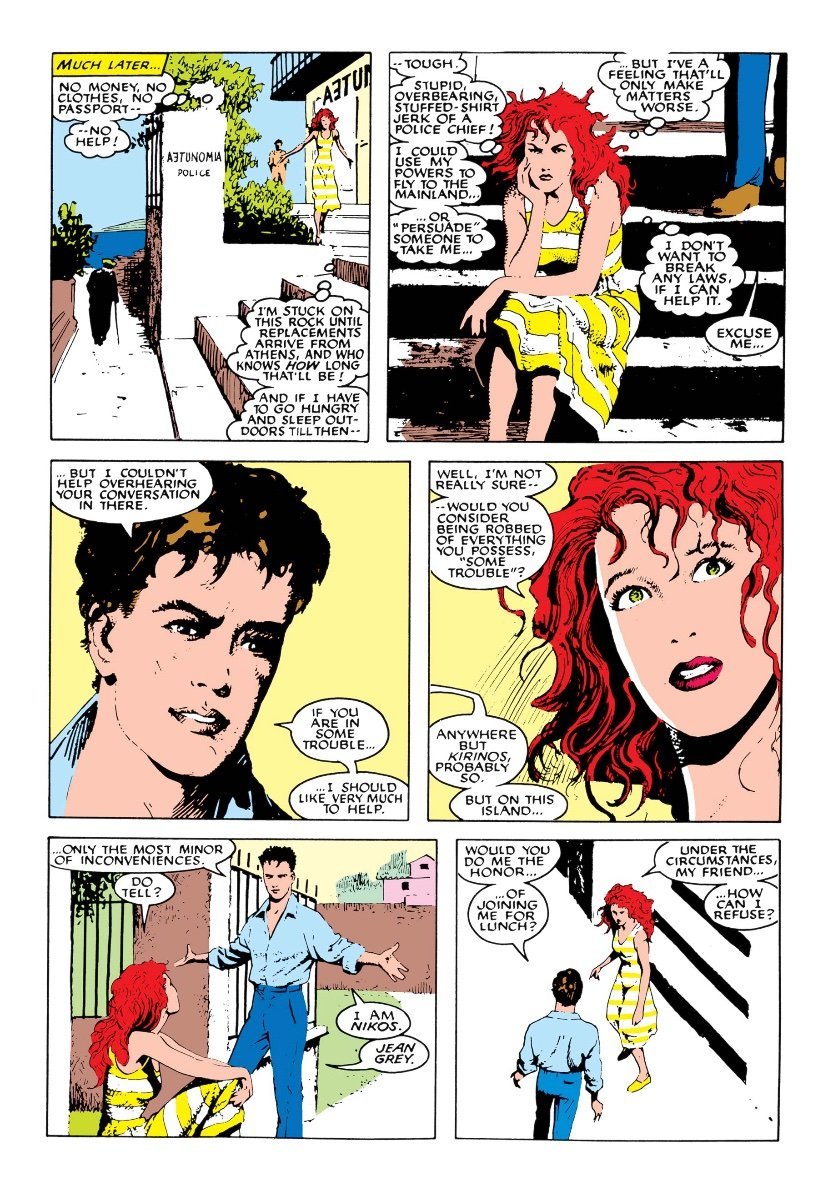

Still grappling with grief, guilt, and trauma behind the X-Men's seeming death, Jean is vulnerable to Wyngarde's deceptions. Capitalizing on this, he has her mugged, sequesters her on an island, and introduces himself to her as a handsome, helpful local. 11/36 







Throughout the story, he ingratiates himself with and seduces her. His advances leave her vacillating between feeling cautious, guilty, a sense of total abandon, and, ultimately, terror. "I'm a human being—I'm Jean Grey!" she screams before fleeing from him. 12/36 







Back in the present, It is clear Wyngarde is eroding Jean's inhibitions. Later, his assaults intensify, and he begins gaslighting her with increasing frequency. He transports her psyche to an unfamiliar era and place for the first time, which makes her question her sanity. 13/36 







She barely has time to register that the X-Men are alive before Wyngarde thrusts her into a series of disturbing scenarios in which he tries to trick her into killing a man and convinces her he is her lover. Her shock and despair underscore the cruelty of his abuse. 14/36 







Jean and Scott soon reconnect, though she keeps the "timeslips" she has been experiencing and the distress they cause her to herself. Finally, Wyngarde transports her psyche to their illusory wedding before she surrenders to his illusions, indicating he has worn her down. 15/36 







Later, after feeling Kitty Pryde's "stark terror," Jean kills a group of Hellfire Club henchmen who pursue her. Her empathy-fueled fury perhaps represents her own unconscious lashing out at Wyngarde's abuse. She nearly figures out his scheme but is interrupted by Scott. 16/36 







Before Wyngarde takes complete control of Jean and pushes her to commit her darkest acts, her morality and inhibitions continue to dissipate. She also becomes more indulgent in her power and sexuality, which Wyngarde has undoubtedly encouraged. 17/36 







Finally, Wyngarde's persistent gaslighting and physical perpetrations result in Jean's complete dissociation and transformation into the Black Queen. Ricocheting between grief, terror, and intoxication, she has not had a chance to reflect on and process her experiences. 18/36 







Jean's dissociation is underscored by the fact that she does not recognize her friends, whom she ridicules and attacks, and adopts an ideology and personality not her own. Scott notes, "She's flirting with [all the men]. Mastermind's given her the instincts of a minx." 19/36 




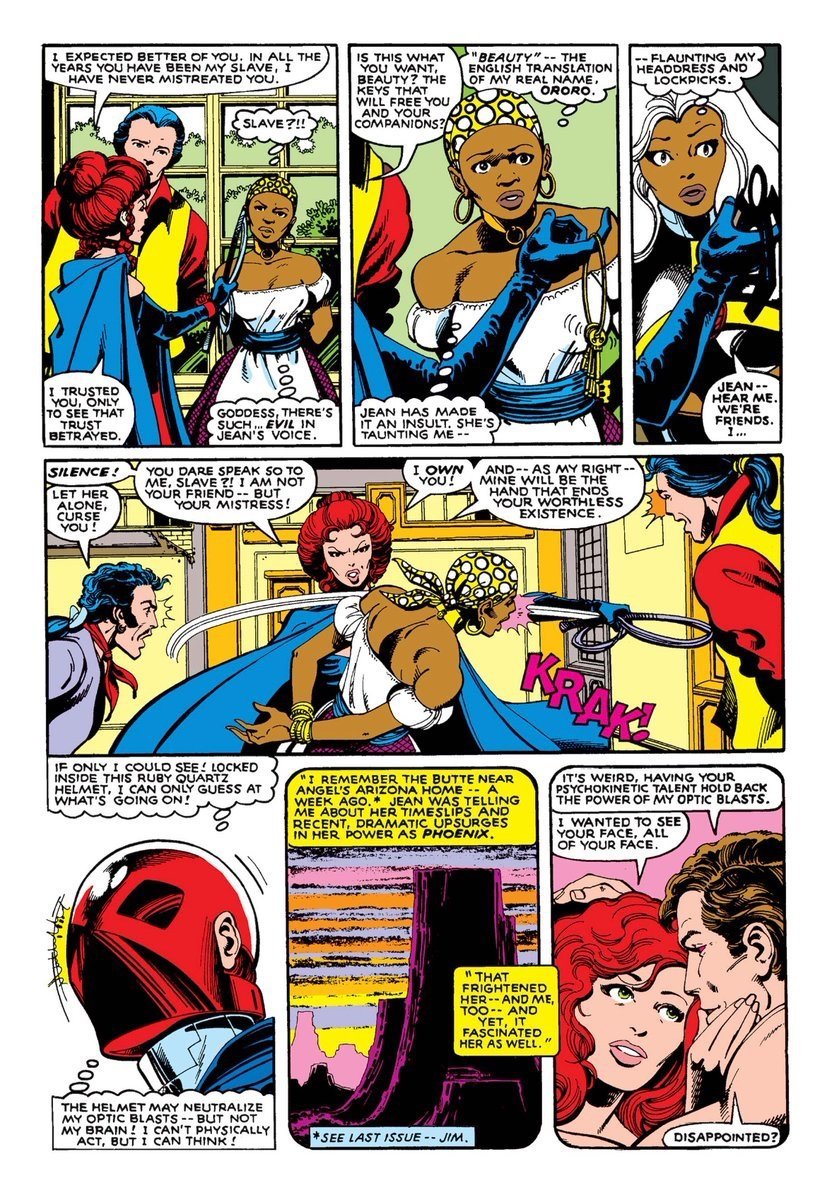


Wyngarde's total control of Jean is further emphasized when Scott discovers that, even when communicating with her through the psionic rapport they share, she does not recognize him. It takes the shock of watching him seemingly killed to gradually awaken and infuriate her. 20/36 







Finally, Jean confronts Wyngarde. One can interpret her saying to him, "You tailor[ed] your illusions to fit my most private fantasies," as indicating he only manifested her desires, but this is an oversimplification of his abuse. First, Jean's thoughts are still clouded. 21/36 





Second, Wyngarde's degradation of and perpetrations against Jean—and other women—should not be overlooked, considering the pernicious effects such abuse and trauma can have on victims. Far from simply granting Jean her wishes, he forces and grooms her to accept his own. 22/36 



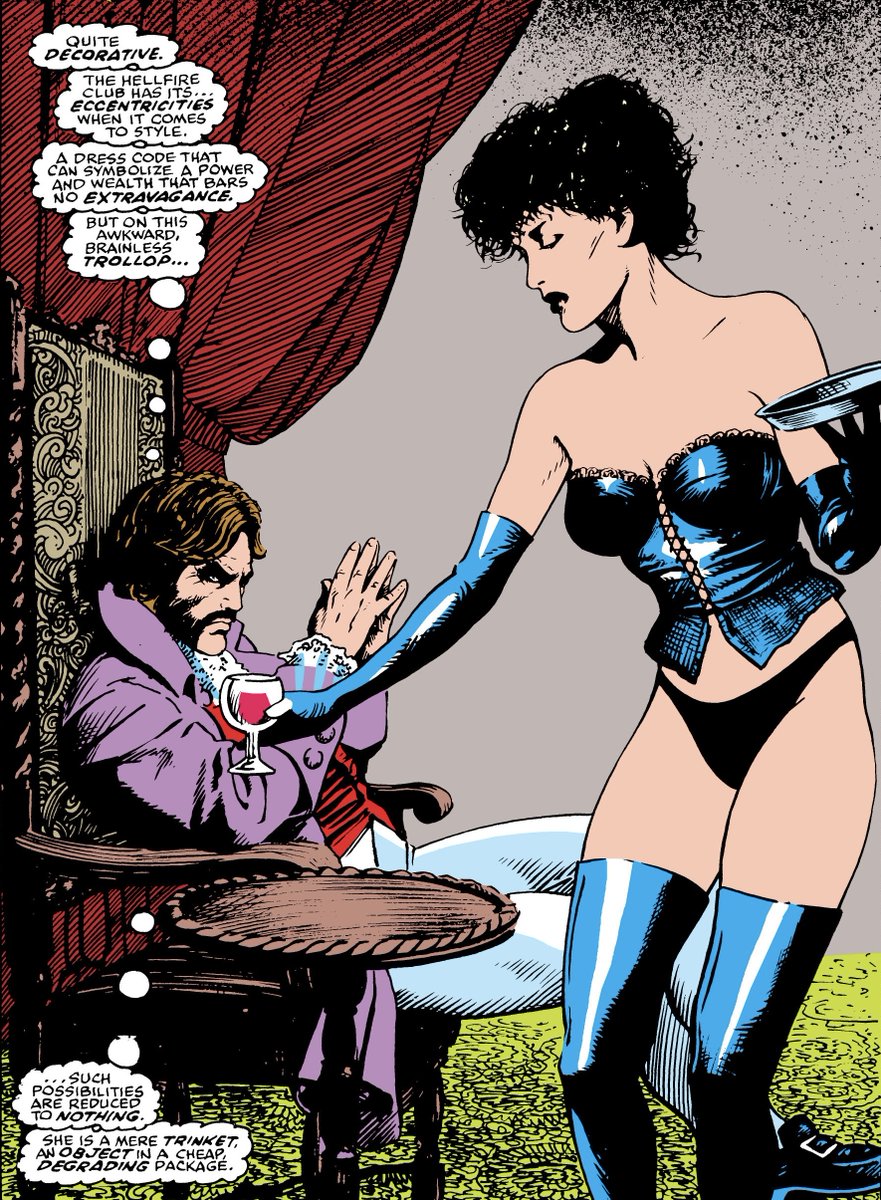



As previously noted, Wyngarde tailored his illusions to fit his and the Hellfire Club's historical antebellum notions, ideology, and aesthetics, not Jean's. Her hunger for love and power, which are base and instinctive human desires, was exacerbated by her grief. 23/36 





Coupled with the layers of defeat and despondency John Byrne imbues Jean with here, Claremont's dialogue and exposition alert the reader that this is not a woman simply fighting off her desires but reeling from trauma and physical and psychological abuse. 24/36 



By the time Jean transforms into Dark Phoenix, the cumulative effects of the grief, intoxication, and violations she has endured overwhelm her. Her rage is symptomatic of a post-traumatic stress breakdown, wherein she lashes out in a fight and flight response for survival. 25/36 

Moreover, Phoenix's raison d’être is to create life and destroy what it deems crude, corrosive, or obsolete, which is what Wyngarde's perpetrations were to her. Her turn towards destruction can be interpreted as equal parts instinctive duty, self-defense, and dissociation. 26/36 




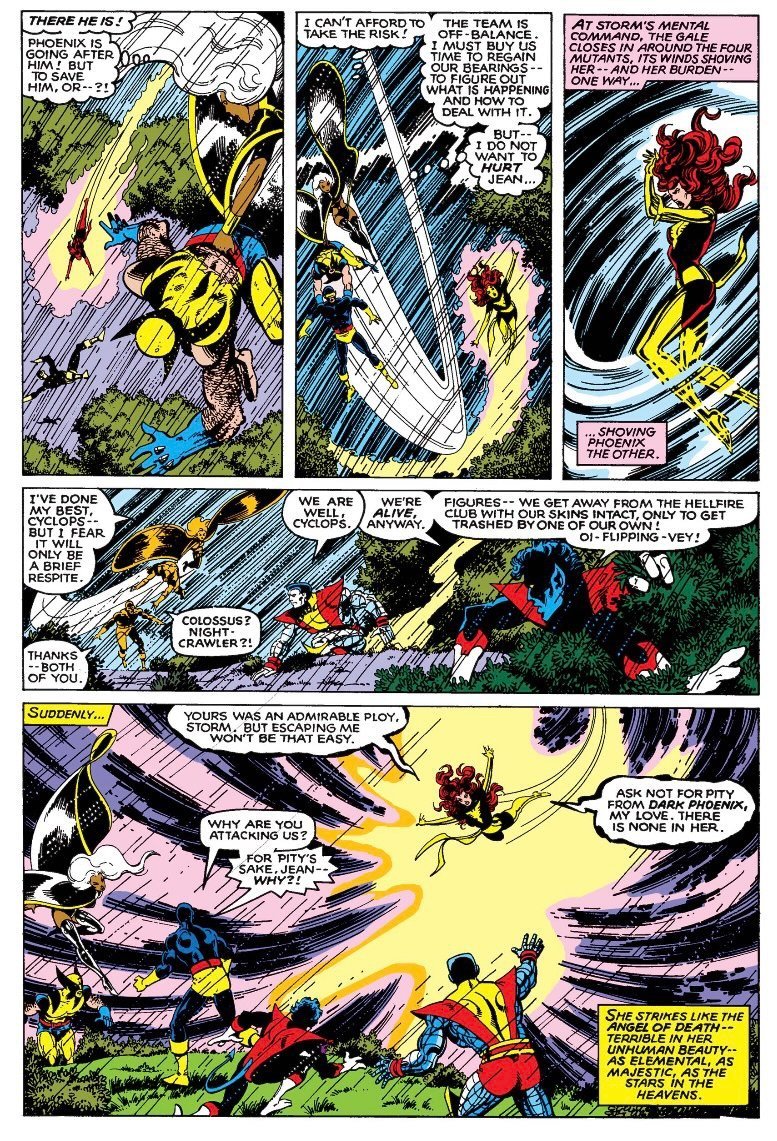


"By striking you down, I cut myself free of the last ties binding me to the person I was," Jean says above. Only Ororo intuits her "pain [and] great sadness." Ultimately, Jean's rage and "lust" are borne from her desperation to escape the anguish of being violated. 27/36 

Her fury and hunger for an intoxicating relief from despair thrust her into deep space and prompt her to consume a star. Before she realizes it, she unintentionally destroys a star system and planet inhabited by a civilization comprised of billions of living beings. 28/36 







In the clip below (go to 1:50), Claremont clarified that Jean’s destruction of D’Bari was unintentional—“by accident”—and all the more tragic as a result. 29/36
Moreover, Claremont notes that Jean emerged from being "sucked up into this Black Queen personality"—"a cruel, decadent trip"—and was "overwhelmed," "reacting, not acting," and "not sane." He implies she had "diminished capacity," a legal term for psychological distress. 30/36 


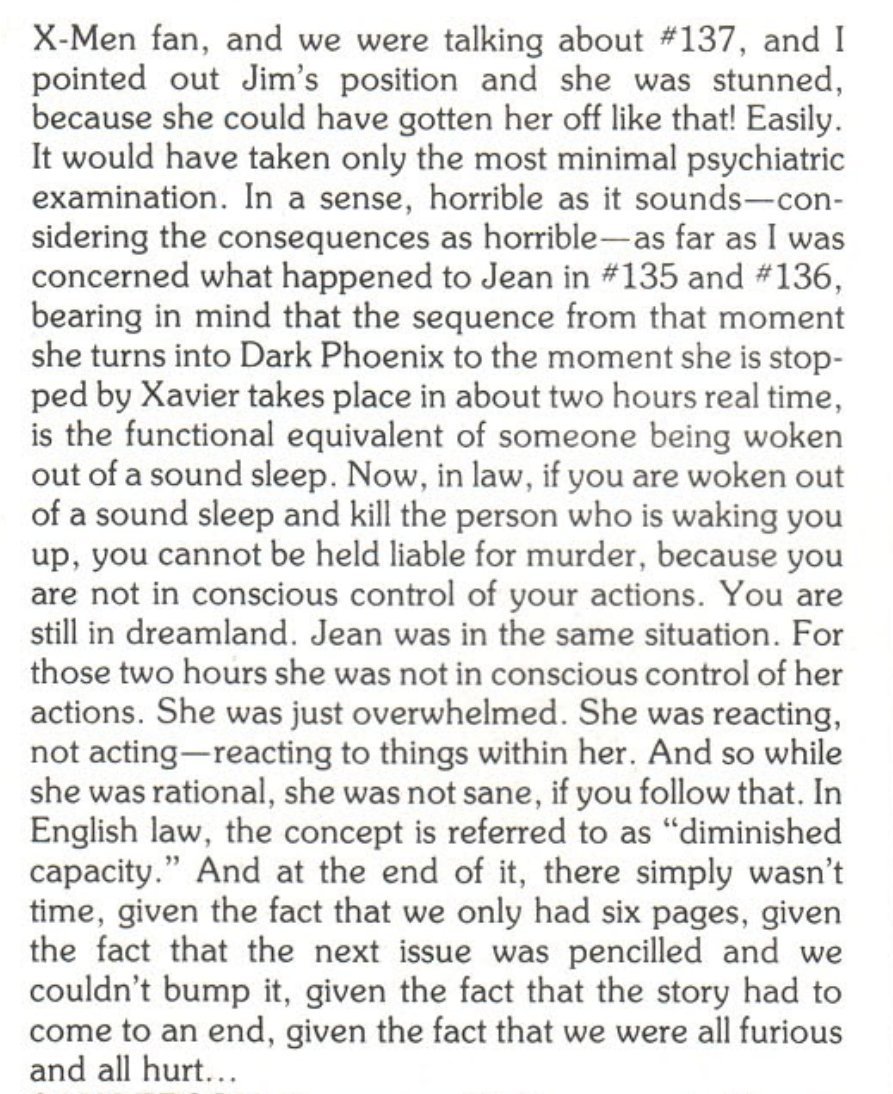
After Jean unintentionally destroys D’Bari and defends herself from a Shi’ar cruiser that tries to subdue her, she heads to her childhood home. Even in a dissociated state, she craves the comfort and security of her family, but they are frightened of her, which hurts her. 31/36 






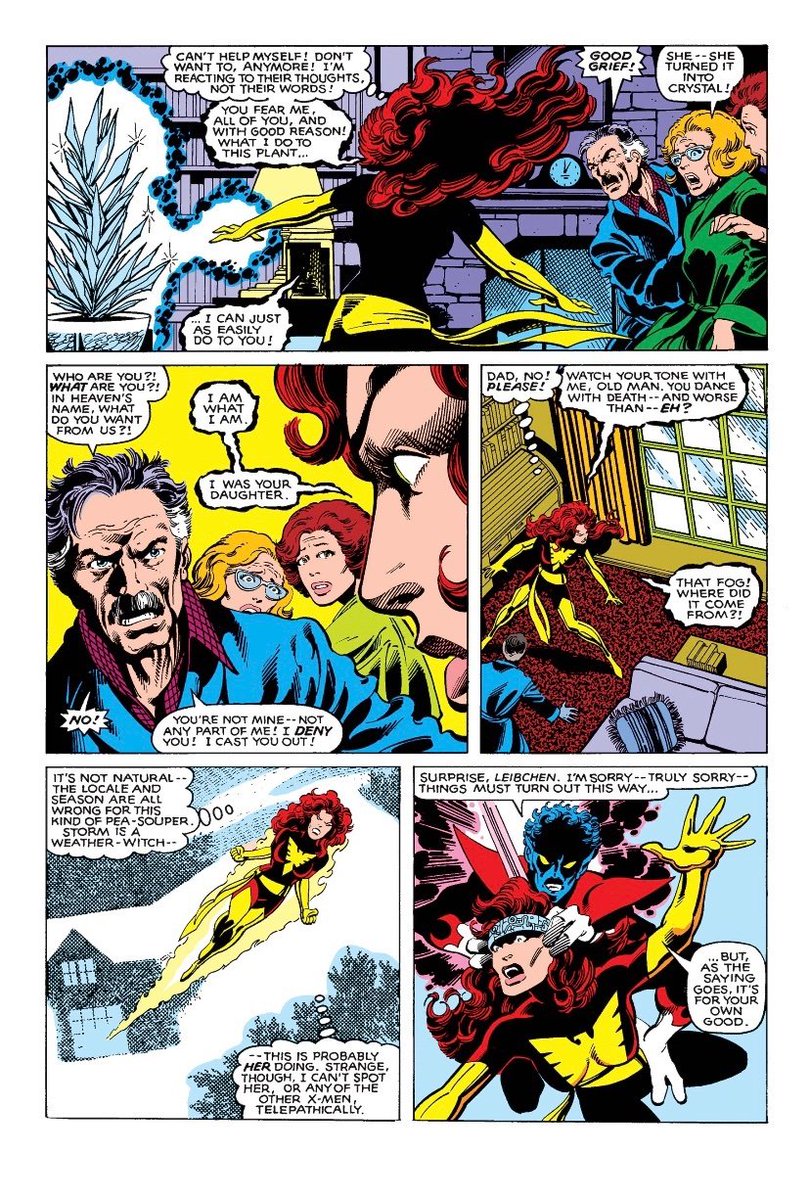
As her friends intervene and try to help her, Jean vacillates between rage and despair, much like a victim in the throes of a post-traumatic breakdown or an addict struggling to control their cravings. At one point, she begs Wolverine, “Finish me with your claws.” 32/36 







Finally, with Jean’s help, Xavier subdues her using a “network of psionic circuit breakers,” essentially tranquilizing her. After the Shi’ar capture the X-Men and agree to let them fight for Jean’s life, Jean and Scott reflect on what has happened and is about to transpire. 33/36 







During the battle, Scott is attacked by the Shi’ar, and “the cry of shock and grief and terror that well[s] within [Jean] shatter[s] the psychic restraints.” She begs to be killed, feeling she will never be rid of Dark Phoenix, before fleeing and finally committing suicide. 34/36 





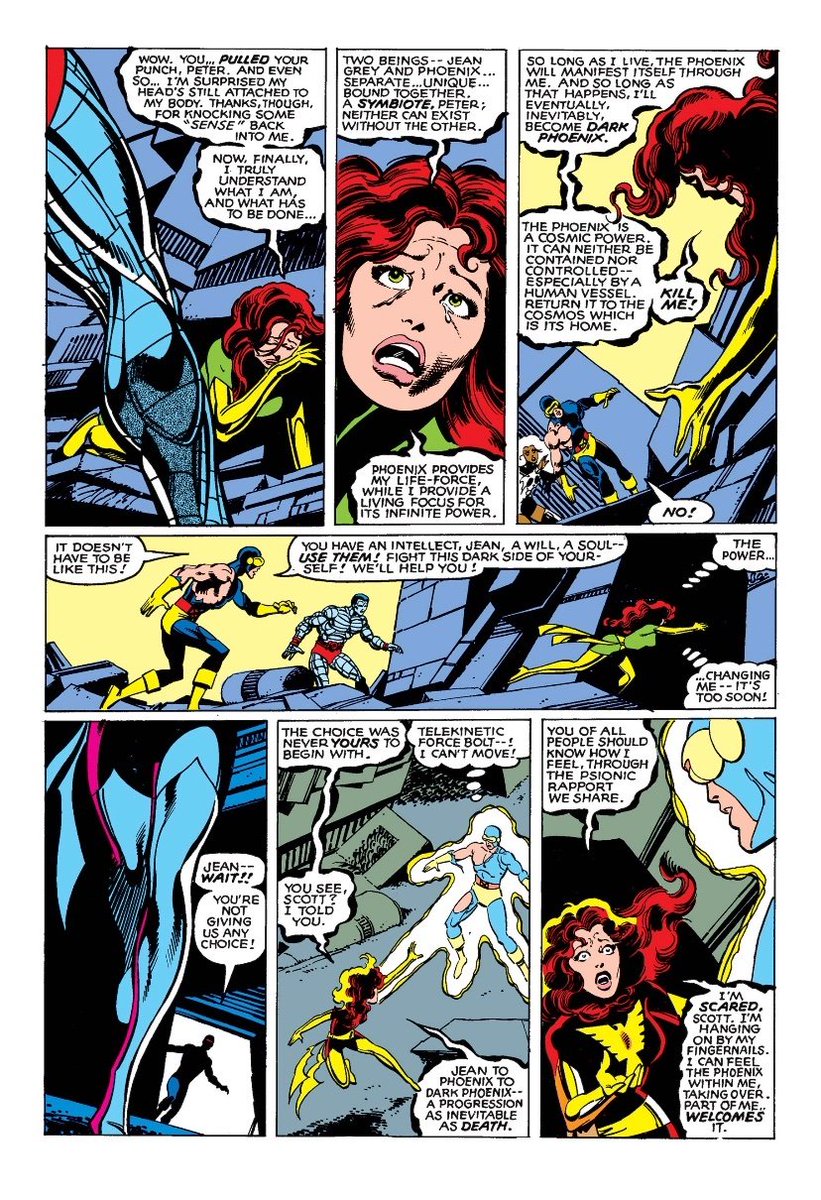

In the end, Jean was stripped of her agency and autonomy, abused and traumatized, transformed into someone and made to do things both foreign and abhorrent to her. She could have lived to become a god, but it was the weight of her pain and the unspeakable that killed her. 35/36 

And ultimately, it was Jason Wyngarde and the Hellfire Club's hunger for absolute power that not only corrupted them absolutely but also drove them to violate, corrupt, and shatter a young woman in the prime of her life. 36/36 

• • •
Missing some Tweet in this thread? You can try to
force a refresh






































